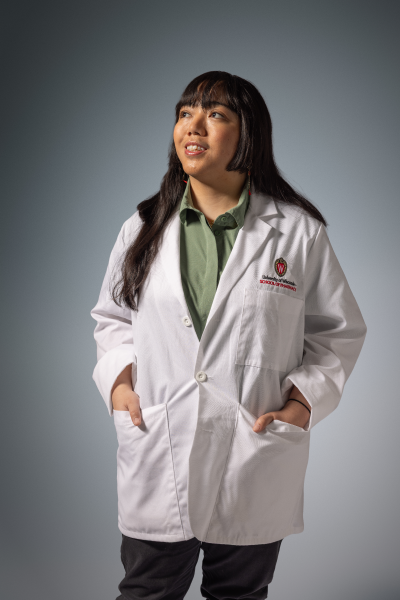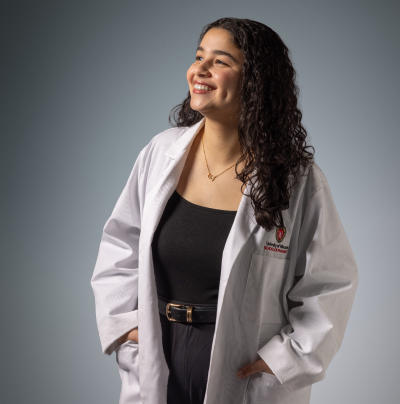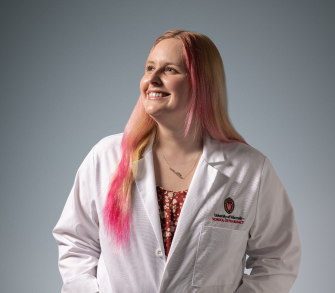The Clinical Training Experiences That Took Me From Nervous Beginner to Confident Future Pharmacist
By Adriene Nuelle DA Agcaoili, PharmD Class of 2026

This sense of vulnerability didn’t last long. During my Introductory Pharmacy Practice Experience (IPPE) at Walgreens in Green Bay, Wis., I learned how pharmacists don’t just fill prescriptions. With my supervising pharmacist, I met an elderly man whose confusion over his medications led to dangerous swings in blood pressure. I sat with him patiently, clarifying his medications and dosage schedule—my voice steady, empathy sincere. It wasn’t the high-paced spectacle of hospital rounds, but it was foundational in shaping me into a communicator and an advocate.
At the heart of patient care
That initial week of IPPEs was a “boot camp” where I quickly realized pharmacy was more than pill counting—it was about listening to a patient’s history, measuring blood pressure, knowing the top 200 drugs, and being able to explain them clearly. The School’s IPPE curriculum ensures this early exposure, asking first-year students to immerse themselves in community-based pharmacy outreach.
For my Oakwood Retirement Home rotation, I learned just how essential pharmacists are to the everyday care of our patients. We coordinated complex medication regimens, counseled patients with chronic illnesses, and bridged gaps between providers and patients. For me, it solidified the pharmacist’s role as a patient advocate.
On the ground in the pediatric ICU and specialty pharmacy
The next stage of this journey was my institutional IPPE in the pediatric ICU at UW Health’s American Family Children’s Hospital. Suddenly, I was part of the team that cared for critically ill children, alongside pharmacists who participated in rounds, using weight-based dosing for medications and calibrating electrolyte balances. While I began by shadowing and doing tech-like work, I quickly realized how these tasks were gateways to deeper clinical conversations—about antibiotic stewardship, drug interactions, and pediatric pharmacokinetics. Learning at a Level I trauma center served as a rigorous training ground with some of the most demanding patient cases.
During my third year, I spent eight hours a week in UW Health’s Specialty Pharmacy, which was a more remote setting than I was used to at that point. I was reluctant as I felt that I would be disconnected from my patients because of the lack of in-person contact, but I figured being able to learn more about specialized medications and patients with rare conditions was worth the discomfort. I found myself enjoying the rotation a lot more than I thought I would.
My preceptor (supervising pharmacist) and I worked on a project that helped make medications more accessible to patients and aimed to improve their adherence to their treatment regimen. I was able to reach out to these patients to discuss their treatment and what circumstances have been affecting their treatment. I was able to work with them to create a solution that would help them achieve their health goals. The project was a success with us being able to reach out to over 50 patients and identify hundreds more for the staff to help in the future.
By the end of my third-year IPPEs, I had accumulated 300 hours in both community and institutional settings, and felt the growth from bewildered observer to contributing member of the care team . Yet I knew that the defining moment lay ahead in my fourth year—APPE rotations.
Immersed in emergency medicine, gaining first-hand experience in drug development
Now, I’m brimming with anticipation—not anxiety—for the final stretch. My first APPE in the overnight emergency room at the SSM Health hospital will be do-or-die fast. Under pharmacist supervision, I’ll be managing codes, verifying emergency medications under pressure, and collaborating with nurses and physicians in life-and-death situations. This kind of immersion is exactly the intensity UW envisions. Their APPEs are full-time, six‑week rotations in core areas—hospital, ambulatory care, community, and systems—with 40‑plus-hour weeks that often feel more like residency training .
A rotation in Froedtert Hospital’s Surgical Intensive Care Unit (SICU) comes next. As a Level I academic medical center, Froedtert pushes pharmacists to practice at the top of their license—decentralized coverage, ICU rounds, rapid medication adjustments, and direct patient interaction. I can already picture the scene: walking through double doors into a world of ventilators, hemodynamic monitoring, and complex pharmacotherapy. I’ll learn not just to suggest doses, but to stand tall recommending them, explaining rationale, and defending them to medical colleagues.
My clinical trial rotation at Froedtert is another cornerstone. Investigational drug services, protocol adherence, patient recruitment, adverse event monitoring—I’ll be in the center of cutting-edge research workflows. UW–Madison encourages elective rotations precisely to match student passions, from oncology to international health. This alignment builds both competence and confidence.
Becoming a practice-ready pharmacist
Through the clinical training via IPPEs and APPEs, UW–Madison nurtures every facet of a pharmacist’s skill set. Introductory experiences teach humility, professionalism, and foundational workflows. Advanced experiences refine clinical judgment, interprofessional teamwork, and autonomy. In the emergency room, I’ll learn swift decision-making. In the SICU, I’ll master critical care dosing. In clinical trials, I’ll gain research skills and protocol navigation. UW’s structured program with core rotations and electives ensures no domain is left untouched.
I’m no longer lost in unfamiliar hallways or overwhelmed by drug monographs. Instead, I visualize myself confidently walking into any healthcare setting—ER, ICU, specialty pharmacy—with the competence to contribute meaningfully and the calm to face challenges head-on. The UW–Madison School of Pharmacy doesn’t just train pharmacists—it crafts clinicians who collaborate, innovate, and lead.
When I complete these rotations, I won’t just walk across the stage with a diploma—I’ll walk in as a practice-ready pharmacist, steeped in hands-on experience. My journey, from a volunteer with zero pharmacy background to a soon-to-be PharmD with high-stakes rotations under my belt, speaks to the power of UW’s experiential education. It’s an adventure, and it’s proof: if you want to build a career grounded in clinical resiliency and real-world impact, UW–Madison’s School of Pharmacy is the place to begin.
Learn more about UW’s exceptional clinical training.

What IPPEs and APPEs really mean (and the experiences I’ll remember forever)

What I actually did in my introductory clinical rotations (and why it matters)

The UW–Madison School of Pharmacy doesn’t push you in one direction. It gives you the foundation, freedom, and mentorship to explore your direction—whatever that may be.